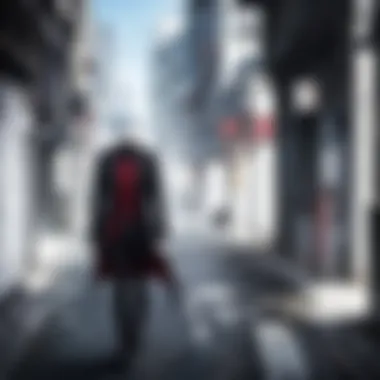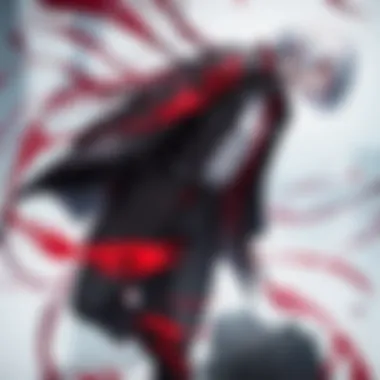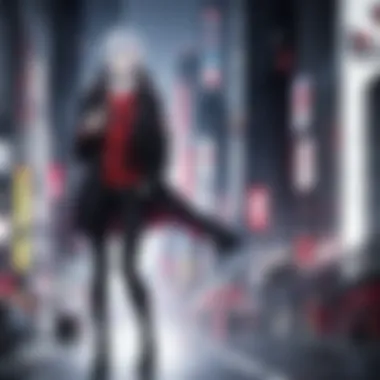Unveiling Tokyo Ghoul: An In-Depth Exploration of the TV Series


Episode Reviews
As we delve into the intricate world of 'Tokyo Ghoul,' each episode unfolds like a dark symphony of events, layered with captivating plot twists and character revelations. The summary of every episode acts as a gateway into the haunted realms of ghouls and humans, as their fates intertwine amidst the backdrop of Tokyo's eerie streets. Analyzing the key events unveils the masterful storytelling prowess of the creators, weaving a web of suspense and intrigue that keeps viewers on the edge of their seats. Character development takes center stage, exploring the evolution of protagonists and antagonists alike, shedding light on their inner struggles and external conflicts. Memorable moments lurk in the shadows, ready to sweep audiences into a whirlwind of emotions and revelations.
Character Spotlights
Within the shadows of 'Tokyo Ghoul,' characters emerge as pillars of strength, vulnerability, and mystery. Each character possesses a rich tapestry of background information, from their origins to their motivations, creating a multidimensional narrative that resonates with audiences. Unraveling their personality traits and unique quirks offers a glimpse into their psyche, showcasing the complexities that drive their actions within the storyline. With each character wielding a distinct role in the intricate plot, speculations and fan theories add layers of anticipation and curiosity, expanding the narrative possibilities beyond the screen.
Anime vs. Manga Comparison
Engaging in the debate between the anime and manga adaptations of 'Tokyo Ghoul' unveils a world of diverging paths and converging storytelling techniques. Examining the plot variances between the two mediums reveals alternate dimensions of the narrative, each with its own strengths and nuances. The artistry and animation quality inject life into the characters and settings, breathing visual appeal into the dark mystical universe of 'Tokyo Ghoul.' Character portrayal nuances between anime and manga spark discussions on authenticity and artistic interpretation, offering audiences a unique lens through which to explore their favorite characters. Fan preferences and opinions serve as guideposts in navigating the vast landscape of creative adaptations, shaping the discourse on the soul of 'Tokyo Ghoul.'
Industry News and Updates
Navigating the ever-evolving landscape of anime and manga industry news surrounding 'Tokyo Ghoul' provides insights into the pulse of creativity and innovation. Announcements on upcoming releases set hearts aflutter, igniting anticipation for the next chapter of the saga. Analyzing industry trends unveils the currents shaping the future of the medium, offering a glimpse into the creative forces at play. Peering behind the curtains of production processes sheds light on the collaborative efforts and artistic visions that breathe life into 'Tokyo Ghoul,' enriching the viewing experience with behind-the-scenes revelations and challenges overcome.
Top Lists
Curating the top 10 lists within the realm of 'Tokyo Ghoul' transforms preferences into rankings, highlighting the favorite characters, episodes, and fight scenes that resonate with fans. Each character and episode finds its place in the hierarchy of fan admiration, reflecting the diverse range of tastes within the community. Compilation of best fight scenes elevates the adrenaline-fueled moments that define the pulse-pounding action within 'Tokyo Ghoul,' showcasing the skillful choreography and emotional stakes at play. Comparisons of different genres within anime and manga offer a window into the multifaceted landscape of creative storytelling, inviting audiences to explore new horizons and genres. Audience polls and feedback serve as guiding beacons, illuminating the collective voice of the community and shaping discussions on the impact and legacy of 'Tokyo Ghoul.'
Introduction to Tokyo Ghoul
Tokyo Ghoul, a dark and captivating anime series, has garnered immense popularity among enthusiasts and newcomers alike. In this comprehensive guide, we will delve deep into the intricacies of Tokyo Ghoul, offering a detailed analysis of its plot, characters, themes, and impact on the anime and manga industry. By understanding the origins of the series to exploring its fan reception, this guide aims to provide a holistic view of Tokyo Ghoul for our readers.
Understanding the Anime Landscape
The Rise of Dark Fantasy Genre
The emergence of the dark fantasy genre has revolutionized the anime landscape, bringing forth a unique blend of darkness, supernatural elements, and intricate storytelling. Tokyo Ghoul stands as a prominent example within this genre, known for its exploration of human nature, morality, and existential themes. The allure of dark fantasy lies in its ability to captivate viewers with its unapologetically grim narrative, challenging societal norms and delving into the depths of human psyche.


Impact of Tokyo Ghoul on Anime Industry
Tokyo Ghoul has left a significant imprint on the anime industry, reshaping audience expectations and setting new standards for storytelling and character development. With its complex characters, thought-provoking themes, and intense action sequences, Tokyo Ghoul has influenced a new wave of darker and psychologically engaging anime series. By pushing boundaries and exploring taboo topics, Tokyo Ghoul has redefined the boundaries of storytelling in the anime medium.
Origins of Tokyo Ghoul
Manga Adaptation
The transition from manga to anime adaptation is a critical aspect of Tokyo Ghoul's success. The manga adaptation has allowed for a more in-depth exploration of the series' narrative, character development, and thematic depth. Fans of the original manga have praised the anime adaptation for staying true to the source material while enhancing the visual and auditory experience. The popularity of manga adaptations like Tokyo Ghoul highlights the enduring appeal of engaging storytelling and complex character arcs in the anime industry.
Key Themes Explored
Tokyo Ghoul delves into a myriad of profound themes, ranging from identity crisis to moral ambiguity, resonating with audiences on a deep emotional level. By exploring the darker facets of humanity and delving into the internal struggles of its characters, Tokyo Ghoul offers a thought-provoking commentary on society, ethics, and personal growth. The depth and complexity of the thematic explorations in Tokyo Ghoul set it apart as a compelling and intellectually stimulating anime series.
Character Analysis
The section on Character Analysis within this comprehensive guide to 'Exploring Tokyo Ghoul' serves as a pivotal exploration of the intricate personas that shape the narrative tapestry of the series. In delving into the characters of 'Tokyo Ghoul,' we unearth the underlying motivations, complexities, and developments that drive the storyline forward. Through this analysis, readers are afforded a deeper understanding of the psychological, emotional, and moral dimensions that define each character, offering a nuanced perspective on their roles within the overarching plot.
Protagonists and Antagonists
Ken Kaneki: The Tragic Hero
Diving into the core essence of Ken Kaneki as the Tragic Hero brings forth a profound examination of his character arc within the series. Ken Kaneki's evolution from a regular university student to a half-ghoul navigating the complexities of his newfound identity encapsulates the overarching themes of loss, struggle, and sacrifice prevalent in 'Tokyo Ghoul.' His internal conflicts, moral dilemmas, and traumatic experiences showcase the depth of his character, making him a compelling and relatable figure for audiences. The central role of Ken Kaneki as the Tragic Hero not only adds layers of emotional resonance to the storyline but also acts as a catalyst for exploring profound philosophical questions inherent in the narrative.
Tokyo Ghoul Investigators
In the realm of 'Tokyo Ghoul,' the presence of the Tokyo Ghoul Investigators serves as a counterbalance to the ghoul characters, offering a perspective rooted in justice, order, and human values. Their relentless pursuit of ghouls, fueled by a deep-seated fear and determination to protect humanity, creates a compelling dichotomy that propels the conflict forward. The Tokyo Ghoul Investigators embody themes of vengeance, redemption, and the fine line between righteousness and moral ambiguity, adding layers of complexity to the narrative. Through their unwavering dedication to their cause, the Investigators not only function as formidable adversaries but also mirror the internal struggles and ethical dilemmas faced by the ghoul characters.
Psychological Depth


Exploring Inner Turmoil
The exploration of Inner Turmoil within the context of 'Tokyo Ghoulatent llucidtesyythsomwentvourage ulreudseavtoion
Plot Overview
The essence of the section [Plot Overview] in this article lies in providing readers with a detailed roadmap of the storyline in 'Tokyo Ghoul'. By dissecting the major developments and arcs of the series, this segment aims to give a holistic view of the narrative structure, thematic progression, and character evolution.
Season Breakdown
Tokyo Ghoul: Root A
Delving into 'Tokyo Ghoul: Root A' unravels a crucial segment of the plot progression. This particular season contributes significantly to the overarching storyline by introducing key characters, deepening the conflicts, and setting the stage for subsequent events. The distinctive feature of 'Root A' lies in its darker tonality and exploration of moral ambiguity, adding layers of complexity to the narrative. While it enriches the storyline, some viewers may find its departure from the original manga source material as a contentious point.
Tokyo Ghoul:re
'Tokyo Ghoul:re', the continuation of the series, plays a vital role in expanding the Tokyo Ghoul universe. With a fresh narrative arc and new character dynamics, 're' brings a refreshing twist to the established storyline. One of its key strengths is the intricate world-building and exploration of deeper themes like power dynamics and societal structures. However, some viewers may find the pacing of 're' a bit convoluted, impacting the overall viewing experience.
Major Story Arcs
Aogiri Tree Conflict
The Aogiri Tree Conflict serves as a pivotal moment in the series, showcasing intense battles, ideological clashes, and character development. This arc shines a light on the complexities of the ghoul society, the blurred lines between good and evil, and the personal struggles of the protagonists. Its significance lies in pushing the characters to their limits and uncovering hidden truths, making it a compelling narrative arc. However, the intricate layers of the conflict may require attentive viewing to fully grasp its nuances and impact.
Rue Island Battle
The Rue Island Battle stands out as a climactic showdown that culminates in significant revelations and character motivations. This arc intensifies the action, emotional stakes, and strategic maneuvering within the storyline. With its high-octane battles and strategic alliances, the Rue Island Battle keeps viewers on the edge of their seats. Nonetheless, the fast-paced nature of this arc may lead to some nuances being overlooked, requiring a keen eye to appreciate its full narrative richness.
Themes and Symbolism


Exploring the intricate themes and symbolism within 'Tokyo Ghoul' is a paramount aspect of this in-depth analysis. The series delves into profound concepts such as existentialism, identity, and moral ambiguity, offering a rich narrative tapestry for viewers to unravel. By dissecting these thematic elements, viewers can gain a deeper understanding of the underlying layers that elevate the storytelling of 'Tokyo Ghoul.' The exploration of these themes not only adds depth to the narrative but also invites viewers to contemplate the broader philosophical questions raised by the series.
Existentialism in Tokyo Ghoul
Existentialism serves as a central pillar in 'Tokyo Ghoul,' permeating the narrative with existential crises and profound philosophical quandaries. One poignant aspect explored within the series is the theme of 'Struggle for Identity.' Characters grapple with their sense of self, wrestling with the duality of their nature and societal expectations. This theme is a vital component of the overarching narrative, as it drives character development and challenges viewers to reflect on their own understanding of identity and belonging.
Another significant theme is 'Moral Ambiguity,' which underscores the complex ethical dilemmas faced by characters in 'Tokyo Ghoul.' The series navigates moral gray areas, blurring the lines between right and wrong, good and evil. By embracing moral ambiguity, 'Tokyo Ghoul' challenges traditional notions of morality and compels viewers to question the rigid boundaries of ethical behavior. This theme injects a sense of realism into the narrative, presenting characters with multifaceted choices that elicit empathy and introspection.
Symbolic Imagery
Symbolic imagery in 'Tokyo Ghoul' serves as a visual language that conveys deeper meanings and thematic resonance. 'Mask Symbolism' is a prevalent motif in the series, symbolizing concealment, duality, and the masks we wear in society. Masks serve as a metaphor for hiding one's true self, mirroring the characters' internal conflicts and the facades they present to the world. This symbolic imagery adds layers of complexity to character dynamics, unveiling the intricacies of their psychological struggles.
Another compelling aspect is 'Cannibalism as Metaphor,' wherein the act of consuming flesh transcends its literal interpretation, representing a devouring of one's humanity and descent into darkness. This metaphorical theme explores the primal instincts and internal battles within characters, weaving a narrative tapestry of moral decay and existential dread. By employing cannibalism as a metaphor, 'Tokyo Ghoul' confronts viewers with uncomfortable truths about human nature and the fragility of morality.
Fan Reception and Impact
In delving deep into the extensive world of Tokyo Ghoul, understanding the fan reception and impact holds paramount significance. The intricate web of fan reactions, critiques, and overall reception plays a pivotal role in shaping the essence of the series. Tokyo Ghoul's ability to garner a cult following and its lasting impact on the anime and manga community is a testament to the depth of its storytelling and character development. By dissecting the fan reception and impact, we gain insight into the series' significance within the broader culture of its genre, unraveling the layers of appreciation it has accumulated over time.
Cult Following
-#### Fandom Analysis:
The aspect of Fandom Analysis within the realm of Tokyo Ghoul provides a unique lens through which to explore the intricate relationship between creators and audience. By delving into the nuances of fan theories, character analysis, and fan-created content, we uncover the multifaceted nature of fan engagement with the series. Fandom Analysis allows enthusiasts to connect on a deeper level, fostering a sense of community and shared passion for the complexities present within Tokyo Ghoul. While offering valuable insights into the series, Fandom Analysis also serves as a platform for creative expression and collaborative discussion, enriching the overall viewing experience.
-#### Merchandise and Fan Creations:
The exploration of Merchandise and Fan Creations surrounding Tokyo Ghoul unveils a vibrant ecosystem of artistic expression and collectibles inspired by the series. From intricately designed figurines to elaborate fan art, the world of Tokyo Ghoul merchandise reflects the ardent dedication of its fan base. Engaging with merchandise not only allows fans to visually connect with their favorite characters but also serves as a tangible representation of their appreciation for the series. However, while merchandise and fan creations contribute to the immersive fan experience, it is essential to navigate the fine line between commemoration and commercialization, ensuring that the essence of the series remains at the forefront of all creative endeavors.
Influence on Subsequent Works
-#### Tokyo Ghoul's Legacy:
The legacy of Tokyo Ghoul reverberates throughout the anime and manga landscape, leaving a lasting imprint on storytelling, character dynamics, and thematic exploration. Delving into Tokyo Ghoul's Legacy sheds light on its enduring impact on creators and audiences alike, inspiring a new generation of narratives that explore the depths of human nature and moral ambiguity. By examining the core themes that Tokyo Ghoul introduced to the genre, we uncover a tapestry of influence that has shaped subsequent works, paving the way for thought-provoking storytelling and rich character development.
-#### Similar Series in Genre:
Exploring Similar Series in Genre allows us to chart the evolution of dark fantasy storytelling post-Tokyo Ghoul, identifying the key characteristics and thematic elements that have emerged in its wake. By analyzing the parallels between Tokyo Ghoul and its contemporaries, we uncover a network of interconnected narratives that share a common lineage of introspection and psychological depth. While drawing inspiration from Tokyo Ghoul, these similar series in the genre embark on distinct explorations of existential crises, moral dilemmas, and the essence of humanity, expanding the boundaries of storytelling within the realm of anime and manga.







